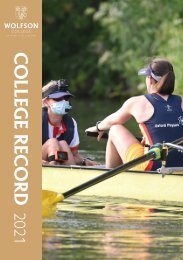You also want an ePaper? Increase the reach of your titles
YUMPU automatically turns print PDFs into web optimized ePapers that Google loves.
Education and Offenders<br />
by James Crabbe (SF), JP<br />
I would argue that the shortage in skills in the United Kingdom is as wide as it was<br />
in the 1960s. Addressing this requires novel approaches to learning and skills, not<br />
least for those people in prison, and for those young people brought before the Youth<br />
Courts. I believe that there is an opportunity emerging for new groups of actors to<br />
play a significant role in improving outcomes; these include magistrates and the<br />
University and Further Education (FE) sectors.<br />
The ‘classic’ view of education, at least in the UK, is of a unilinear mode of<br />
progression, from nursery / kindergarten to prep / primary school, to secondary, to<br />
university / conservatoire / art school, to post graduate-research or the professions.<br />
Further Education (skills and vocational training) features as a ‘second class’<br />
alternative to University and its potential is neglected, particularly when it comes to<br />
those whose early experiences of learning have been disrupted, distant or difficult.<br />
The Coates Review on Education in Prison, published in May 2016, highlighted<br />
the poor quality of much existing provision and advocated ‘high-quality vocational<br />
training and employability skills that prepare individuals for jobs on release’ (e.g.<br />
through industrial work and training designed with and for employers). In my<br />
view, this should open the door to many further education colleges and universities<br />
working with those in prison, on release and serving sentences in the community, at<br />
the local level. The review proposed that, from August <strong>2017</strong>, all governors be given<br />
the freedom to choose which education providers they want to work with; the recent<br />
replacement of the National Offender Management Service by Her Majesty's Prison<br />
and Probation Service, and within this the new Youth Custody Service, may give<br />
exciting scope for new provision. In addition to providing a potential new market<br />
for college and university recruitment and partnership working in a financially<br />
beleaguered sector, tertiary education institutions could deliver innovative<br />
programmes to recruit and support students who have been involved in the criminal<br />
justice system, to turn their lives around. This has the potential to open up new ways<br />
of improving employability in local communities, and help to decrease skills gaps<br />
and shortages so important in our economy. There are already excellent examples<br />
of both universities and FE colleges who have provided programmes – including<br />
doctoral programmes – for offenders and ex-offenders.<br />
121
















